What We Believe
● We use the Reformed liturgical forms, which we consider to be our minor creeds, in our worship, such as the Form for the Administration of Baptism, Form for the Administration of the Lord’s Supper, and Form for Ordination of Elders and Deacons, along with others.
● We believe that the sixty-six books of the canonical scriptures, the Bible, are the infallible, inspired Word of God. Nothing may be added to or removed from the Word of God (Prov. 30:6; Rev. 22:18–19; Belgic Confession article 4). We believe that the Word of God is all-sufficient for faith and life, as is taught in 2 Timothy 3:16: “All scripture is given by inspiration of God, and is profitable for doctrine, for reproof, for correction, for instruction in righteousness.”
● We hold to the five points of Calvinism: total depravity, unconditional election, limited atonement, irresistible grace, and perseverance of the saints. We reject all doctrines contrary to these tenets of the historically Reformed faith.
● We believe in the triune God, that is, in one being consisting of three persons: Father, Son, and Holy Spirit. The perfect covenantal relationship of the three persons in the Holy Trinity is a beautiful picture of the covenant that God establishes with his elect people.
● We believe that God created by his Word all things out of nothing in six, literal, twenty-four-hour days. God created all things good, that is, without sin. He created man, both male and female, as the head of the creation and in his own image with true knowledge, righteousness, and holiness (Heidelberg Catechism, Lord’s Day 3, Q&A 6). We reject the idea of a covenant of works, that man by his obedience in the garden could merit heavenly life. God’s creation of man in his image and likeness was such a forming that God created man in a covenant relationship with him. God and Adam walked together in the garden in covenant with one another, God as friend-sovereign, and Adam as friend-servant (Gen. 3:8).
● Man, by the instigation of the devil and by his own disobedience, fell into sin and brought both physical and spiritual death into the world as punishment for sin (Gen. 2:17). This original sin of Adam extends to all mankind, so that man is by nature in bondage to sin, guilty for it, and under the curse of God for sin. In man’s flesh is no good thing (Rom. 7:18).
● We believe that God is sovereign over all. God alone is God. He upholds all things by his counsel and will, so that all of the events of history occur according to his providence. Nothing happens by chance, but all things are foreordained according to God’s determinative counsel. God is not the author of sin, but he is sovereign over it, including the fall of man into sin. God, in his infinite wisdom, was pleased to use the way of sin and grace to exalt himself through the redemptive work of Christ on the cross.
● We believe in double predestination, which includes both election and reprobation. From eternity and according to his own good pleasure, God appointed some to salvation in Christ Jesus, and he appointed others to damnation. That God appointed some to salvation and others to destruction was in no wise due to any good or evil that was done in time (Rom. 9:13). God judges the reprobate on the ground of their sin and unbelief, but neither are the cause of their reprobation. The promise of salvation from sin into eternal life and glory in Christ is only for the elect, whom God eternally set his love on and willed to save in the cross of his dear Son.
● We believe that God sent his only-begotten Son into the world as the fulfillment of his covenant promise to his elect people for salvation, which covenant runs through the entire Word of God. God’s purpose with all history is the perfection of his covenant. “Behold, the tabernacle of God is with men, and he will dwell with them, and they shall be his people, and God himself shall be with them, and be their God” (Rev. 21:3). And in Hebrews 8:10, “For this is the covenant that I will make with the house of Israel after those days, saith the Lord; I will put my laws into their mind, and write them in their hearts: and I will be to them a God, and they shall be to me a people.”
● We believe that Jesus is truly man and truly God, one person with two distinct natures; that he was born of the virgin Mary; and that he came under the law for his elect. He kept the law perfectly, and he suffered and died on the cross as payment for the sins of God’s people. By his death on the cross, he made satisfaction for the sins of God’s elect people. We believe that Christ is a complete savior (Lord’s Day 11) and that God’s people fully and freely enjoy all of salvation by his redemptive work alone (Lord’s Day 6).
● We believe in the absolutely unconditional covenant of grace in its conception, maintenance, experience, and perfection. We believe that the covenant (the bond of friendship and fellowship between the triune God and his elect) is unilateral. The covenant originates and flows from God alone. In the covenant there are two parts but only one party. God gives his people their part of the covenant, namely, their life of good works. God establishes his covenant with the elect and their elect seed (Form for the Administration of Baptism).
● We believe that marriage is for life (Matt. 19:6; Mark 10:9) and is to be between one man and one woman (Gen. 2:18–24; Eph. 5:31). In marriage God joins together a man and woman and makes them one flesh. Therefore, we believe that divorce and remarriage is sinful according to the Word of God. Adultery is the only legitimate reason for divorce, and even in a lawful divorce, the marriage bond is not dissolved, and the divorced spouses may not remarry. Death is God’s dissolving of that marriage bond. Marriage itself is a glorious picture of Christ and his church, and we believe that our marriages must reflect that unconditional, loving character of Christ’s faithfulness to us over against over against our constant sin and spiritual adultery, for which he never forsakes us.
● We believe in the particular call of the gospel and that the gospel must be preached promiscuously to all men wherever God in his counsel has determined to send it (Matt. 28:18–20). God gathers his people from every nation, tribe, and tongue, and he will come again once all of his church is gathered (Rev. 5:9). The elect will certainly and infallibly hear the gospel and repent and believe in that gospel, while the reprobate will be hardened in hatred against that gospel. God alone is sovereign over who hears and who rejects the call of the gospel. We condemn the well-meant offer of the gospel, as this teaching denies the sovereignty of God and makes Christ a weak and beggarly savior.
● We believe the gospel to be the good news of Jesus Christ as the savior of his elect people from sin. The gospel is Jesus Christ and him crucified (1 Cor. 1:23). The gospel is the power of God unto salvation (Rom. 1:16).
● We believe that justification is by faith alone in Jesus Christ without any respect to our works, good deeds, obedience, or repentance (Rom. 3:24; Gal. 2:16; 3:8,11). We believe God justifies ungodly sinners (Rom. 5:6) and that being justified by faith, we have peace with God through Jesus Christ our Lord (Rom. 5:1). We believe that the just live by faith (Hab. 2:4).
● We believe that salvation is by faith alone apart from any of man’s works. Salvation is entirely a gracious gift from God. There is absolutely nothing that man must do to be saved. Titus 3:5-7: “Not by works of righteousness which we have done, but according to his mercy he saved us, by the washing of regeneration, and renewing of the Holy Ghost; which he shed on us abundantly through Jesus Christ our Saviour; that being justified by his grace, we should be made heirs according to the hope of eternal life.”
● We believe that the law of God must be strictly preached (Lord’s Day 44). The law of God serves two functions: it shows us our sins and misery (Lord’s Day 2), and it functions as a rule and guide for our thankful lives (entire third section of the Heidelberg Catechism).
● We believe that good works are only fruits. We believe that we were created in Christ Jesus unto good works (Eph. 2:10). Good works are preordained by God, are a gift from God, and are performed as part of our thankful lives in worship to God. Good works do not earn or merit anything with God, so that man has no reason to boast (Eph. 2:8–9). The Holy Spirit works in us both the willing and doing of his good pleasure (Phil. 2:13). Faith inevitably manifests itself by its confession of the truth of God’s word (Lord’s Day 7) and by its walk in the world (James 2:24; Heb. 11). Because our flesh is totally depraved, all of our good works are defiled by sin.
● We hold to particular grace and are opposed to the false teaching of common grace. God only shows favor to his elect. All things are directed for the good of his people and for the damnation of the wicked.
● We hold to the sacrament of baptism and to the sacrament of the Lord’s Supper. Baptism is administered to the infants of believers in the congregation and to adult converts who make confession of their faith. In the administration of the Lord’s Supper, we believe that it is the calling of the elders faithfully to guard the table against any profaning of that table by unworthy partakers. This practice is called close communion.
● We believe that the covenant demands that believing parents join together in the education of their children in Christian day schools for the instruction of their children in the truth of God’s Word (Lord’s Day 38).
● We believe that God’s people are called to join themselves to an instituted, true church so as to not neglect the means of grace: the preaching of the gospel and the sacraments (Lord’s Day 25, Belgic Confession article 28).
● We believe that the true church can be distinguished by its three marks: the pure preaching of the gospel, the exercise of Christian discipline, and the proper administration of the sacraments (Belgic Confession article 29). 3
● We believe that the church should be governed by spiritual polity that Christ taught in his Word. To that end, the government of the church consists of a minister, elders, and deacons. We also hold to the Church Order adopted by the Synod of Dordrecht.
● We believe that Christ will come again on the clouds of glory in the consummation of time in final judgment to raise the righteous in their bodies to eternal life in heaven and to raise the wicked in their bodies to eternal death in hell. He is coming again quickly to establish his everlasting kingdom, gather his church, and perfect the covenant. “Therefore we expect that great day with a most ardent desire, to the end that we may fully enjoy the promises of God in Christ Jesus our Lord. Amen” (Belgic Confession article 37).

